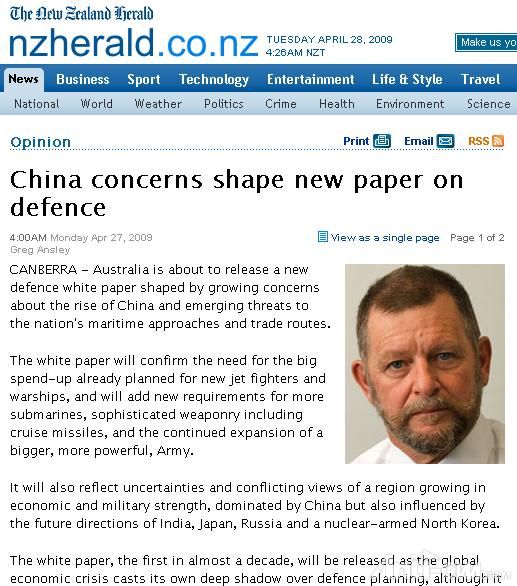|
|
本帖最后由 magicboy 于 2009-4-28 02:11 编辑
【原文标题】China concerns shape new paper on defence
【原文链接】http://www.nzherald.co.nz/opinion/news/article.cfm?c_id=466&objectid=10568880
【时间与作者】4:00AM Monday Apr 27, 2009
Greg Ansley
【正文】
CANBERRA - Australia is about to release a new defence white paper shaped by growing concerns about the rise of China and emerging threats to the nation's maritime approaches and trade routes.
The white paper will confirm the need for the big spend-up already planned for new jet fighters and warships, and will add new requirements for more submarines, sophisticated weaponry including cruise missiles, and the continued expansion of a bigger, more powerful, Army.
It will also reflect uncertainties and conflicting views of a region growing in economic and military strength, dominated by China but also influenced by the future directions of India, Japan, Russia and a nuclear-armed North Korea.
The white paper, the first in almost a decade, will be released as the global economic crisis casts its own deep shadow over defence planning, although it will be years before many of the big-ticket items are actually placed on the shopping list.
Australia has in the past few years already bought, or ordered, new heavy tanks, three air warfare destroyers, two huge, helicopter-equipped amphibious ships, Globemaster transports, helicopters, and a new fleet of upgraded F/A18 Hornet strike jets.
Canberra also intends buying up to 100 joint strike fighters from the United States.
Defence analysts have widely speculated that the white paper will double the size of the submarine fleet from the present six to 12, replace its 12 FFG and Anzac frigates with a new class of warship, and acquire new maritime patrol aircraft.
The Army will get new helicopters, armoured vehicles, artillery and other advanced weaponry.
But the joint strike fighter (JSF) remains highly controversial in Australia amid conflicting claims of its capabilities, and some doubt whether the nation can find the money and personnel to achieve its ambitions.
Australia has also faced several costly problems in buying equipment, including its troubled fleet of Collins submarines, the delayed arrival of key Wedgetail airborne early warning and control aircraft, and the axing of an entire fleet of naval helicopters.
Canberra has also been troubled by regional sensitivities over its defence acquisitions, and debate about the future of China and the need to balance benign views of Beijing's intentions with the possibility of future tensions.
Professor Hugh White, a former senior defence official and one of Australia's leading strategic thinkers, noted in a recent paper for the Lowy Institute that China's economy was likely to overtake America's within a few decades, and as that happened Beijing's strategic and political power would grow.
"America will lose the position of uncontested strategic primacy that has kept Asia so stable and Australia so safe over the past four decades," he wrote. "History shows how easily these power transitions slide to strategic competition and war."
White said the biggest risk was not that China itself would become a direct threat to Australia, but that the erosion of American power could unleash strategic competition among Asia's strongest states, which in turn increased the risk that Australia could face a number of military threats to its interests or even its territorial security.
Rod Lyon, director for the strategy and international programme at the Australian Strategic Policy Institute, said no one knew what China would become.
"On one side of the ledger, a relatively persuasive body of evidence suggests China wants to be seen as a responsible stakeholder," he said.
"On the other hand, China continues to enhance its military capabilities, gradually expanding the 'bubble' of Chinese power outwards from its coastline."
Lyon said Australia's problem was how to react to China's growing power when it did not know whether that power would be exercised for good or ill.
For Australia, the rise of China and other regional powers adds to growing pressure from problems in the near neighbourhood - such as Timor and the Solomons.
Its defence budget for 2008-09 stands at A$22.1 billion, about 1.8 per cent of gross domestic product and 8 per cent of commonwealth outlays.
White argues much more will be needed.
【截图】

|
defence, paper, shape, 先驱, 新西兰, defence, paper, shape, 先驱, 新西兰, defence, paper, shape, 先驱, 新西兰
评分
-
1
查看全部评分
-
|